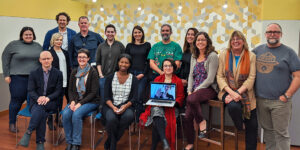Through a collaborative project course, students explore Latinx social movements at Duke and beyond.

As a scholar of the Latinx experience in America, Cecilia Márquez is passionate about sharing the complexity and excitement of this field with her students. Shortly after coming to Duke, where she is the Hunt Family Assistant Professor of History, Márquez joined the inaugural cohort of the Collaborative Project Courses Faculty Fellows Program to consider innovative new ways to teach this rich material.
Through the fellowship, Márquez redesigned her undergraduate course on the history of Latinx activism from the 19th century to present day. Her goal was to create a hands-on learning experience in which students could work together on small teams to examine archival materials and oral histories on the history of Latinx activism at Duke, and then create a public-facing digital project.
Launched in 2019-2020 through a partnership between Duke Learning Innovation and Bass Connections, the Faculty Fellows Program supports faculty in designing project-based courses in which student learning is driven by collaborative research, analysis and communication. These projects create demanding challenges that put students’ skills to the test while also creating opportunities to engage with the surrounding community in meaningful ways.
For Márquez, the fellowship allowed her to set aside time to think deeply about how she wanted to reconceive of her course, and provided a supportive environment where she could get feedback on her revised syllabus and new course plan.
“Teaching is a real skill we’re not often given a lot of guidance in,” said Márquez. “What was really exciting to me was to be gathered with all these people across different disciplines who are similarly committed to figuring out how to integrate active problem-based learning into our classroom.”
She taught her redesigned course, History 366S: Latinx Social Movements, in Spring 2021. The course follows the history of Latino/a organizing from the 1940s to present day, beginning with the Chicano movement in the 1940s to present day activism like UndocuQueer.
Nathalia Compresperez took the course as a first-year student. “I feel like there’s not enough classes detailing the history of Latinx people, and especially not many being taught by Latinx people themselves,” she said. “It was a really great opportunity for representation and learning about yourself.”
